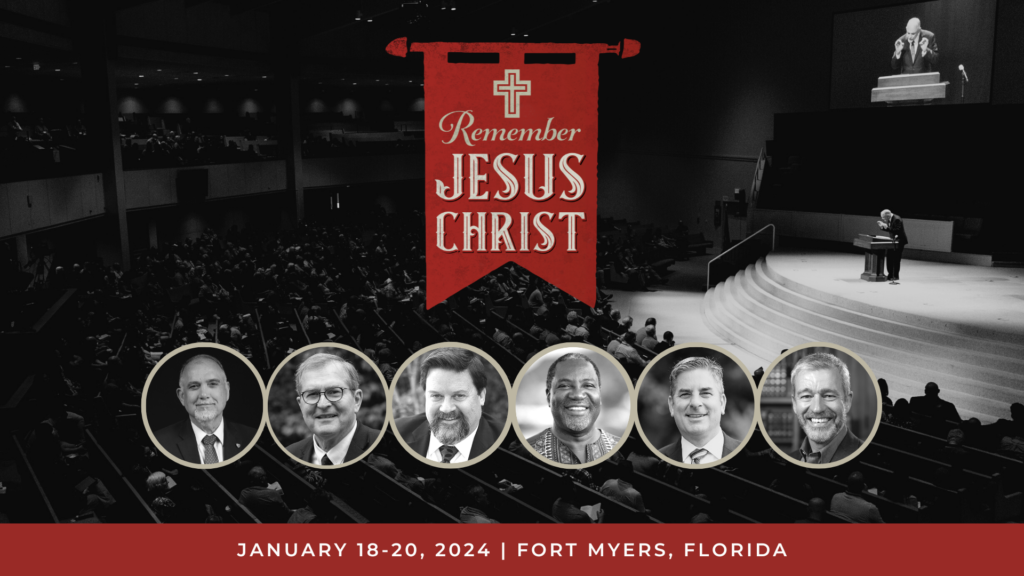The theme of the 2024 Founders Conference surrounds Paul’s admonition, “Remember Jesus Christ, risen from the dead, out of the seed of David, according to my gospel.” God willing, and according to his enlightenment and strength, I want to discuss this sobering theme in a series of posts focusing on the biblical developments of “remember.” The word points to events that are both pivotal and central. Not only do they give a swift alteration of direction for humanity, but they rise to a culmination and a subsequent response in thought and deed. The flow of the entire biblical text presses forward to this command, “Remember Jesus Christ.” It summarizes every other call to remember. I intend also to describe historical manifestations of the loss (forgetting) and recovery (remembering) of this culminating event in the history of redemption.
“Remember” calls to mind central admonitions in the history of God’s revelation of redemptive power to his people. The command is not for a mere mental recall of an event or a casual reminder of a person’s name or status. It is a critical summons to put an event or person or commitment so at the center of your concern that the weight of its importance transforms your thinking. When the thief said to Jesus, “Remember me when you come into your kingdom,” (Luke 23:42) he wanted to be taken personally by Jesus into that status of perfect, sinless, beneficent rulership. Jesus responded with an answer commensurate with the purpose of the request, “Truly I say to you, this day with me you will be in paradise” (Luke 23:44). “As surely as my work of atonement will bring me into the glory of heaven in the presence of the Father, so it will do for you.” The request of the crucified thief was for Jesus’ personal investment in the eternal well-being of his mind, body, and soul—”Remember.”
“Remember the Sabbath day, to keep it holy” (Exodus 20:8), involves more than simple mental recall, but an investment of life in the rhythm of divine labor. As God worked for six days in creation, so should these redeemed people labor for six days at life-sustaining tasks that deserved their energy. As God had finished creation and then rested, so were the people rescued from relentless labor in Egypt to embrace a sabbath as instituted and practiced by God on the seventh day. All the animals, each member of the family, all the nation would so esteem the glory of the Creator/Redeemer/Covenant God that their lives individually and corporately would be defined by it. “Remember Jesus Christ” has that same claim on the lives of his redeemed ones but with an even greater intensity in light of an even more powerful delivery.
In Genesis 9:15, God said to Noah that he would “remember my covenant” made with the whole earth never again to destroy all flesh by flood. At the appearance of the rainbow in the cloud (which God himself makes), “I will look on it to remember the everlasting covenant between God and every living creature.” God’s promise to remember reflects a decree set in the context of his own integrity, a promise made by the unlying God (Titus 1:2).
In Leviticus 26:42 and 45 God refers to remembering his covenant with Abraham and Isaac so that he does not destroy the people entirely when they go into captivity: “I will remember the covenant of their ancestors, whom I brought out of the land of Egypt.” When God remembers, he conducts himself in accord with his eternal decree to redeem sinners through a man that would come in the context of a nation and a family, a man whose genealogy is traceable to Abraham and to Adam. The theology of “remember” means that God’s purpose and consequent action of redemption captures the mind and determines the actions.
Deuteronomy 6:12 gives a stern warning “lest you forget the Lord who brought you out of Egypt.” God gave a formula for protection against their fatal forgettings. Generation upon generation should follow this system of instruction? “And these words which I command you today shall be in your heart. You shall teach them diligently to your children, and shall talk of them when you sit in your house, when you walk by the way, when you lie down, and when you rise up. You shall bind them as a sign on your hand, and they shall be as frontlets between your eyes. You shall write them on the doorposts of your house and on your gates” (Deuteronomy 6:6-9). The whole life should be lived in the conscious awareness of God’s authority, his commands, his sovereign mercy, the fearful wonder of his distinguishing grace. The words of revelation that he has given by which the meaning of his historical acts of grace are disclosed must be an ever-present body of informative truth to his people. We must not forget; it must not pass away from our present consciousness that we are saved by free, unmerited, sovereign mercy.
Deuteronomy 8 verses 2, 11, 14, 18, 19 have an antiphonal chorus that works between the seriousness of the command to remember and the devastation wrought by the tragedy of forgetting. “And you shall remember” (2) refers to the Lord’s provisions and testing in the forty years of wilderness wanderings. This was to focus their lives, their hearts, on the revealed word of God as the source of life (3). Should his temporal blessings make them flatter themselves with a sense of independence, they are warned not to “forget the Lord your God” (11) and ignore his commandments. Again verse 14 warns against allowing success in the Promised Land to push aside the obvious dependence that they have on the Lord presently, even as it was undeniable during the testing of the forty years. If they are tempted to say, “My power and the might of my hand have gained me this wealth,” they again are commanded, “You shall remember the Lord our God, for it is he who gives you power to get wealth, that He may establish His covenant which he swore to your fathers” (18). “Remember” challenges the mind to grasp the covenantal mercy of God with such conscientious commitment that nothing can drive a wedge of temporal delusion between the moral and spiritual mind of a person and the infinite power and mercy of divine provision.
When Jesus established the symbol of the final, ultimate, perfect redemptive act, he commanded his followers, “Do this in remembrance of me” (Luke 22:19). When Paul recounted the event for the Corinthians, he connected Jesus’ command of remembrance, do this “in remembrance of me,” with the breaking of the bread and the taking of the cup. “This do,” he said, “as often as you drink it, in remembrance of Me” (1 Corinthians 11:24, 25). Paul added that such an action was a proclamation of the “Lord’s death till he comes” (1 Corinthians 11:26).
The command of Paul to Timothy to “Remember Jesus Christ,” therefore, reaches deep into the biblical text as a prompt to take to heart the covenantal faithfulness of God. “Remember” means to be in active reflection on the saving mercy contained in the eternal covenant and the consequent redemptive action of God in Jesus Christ.
This article is part 1 in a series by Tom Nettles on Remembering Jesus Christ. You can read part 2 here.
Join us at the 2024 National Founders Conference on January 18-20 as we consider what it means to “Remember Jesus Christ” under the teaching of Tom Ascol, Joel Beeke, Paul Washer, Phil Johnson, Conrad Mbewe and Travis Allen.






























